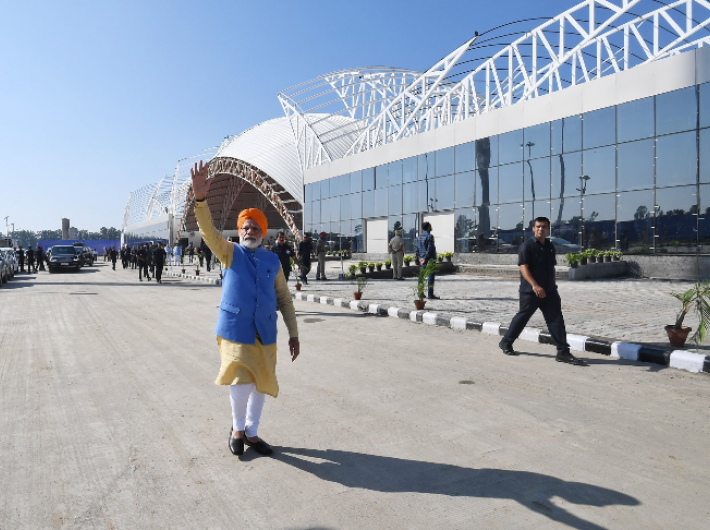Smart move in religious diplomacy brings neighbours together though suspicions remain
When the corridor to the Gurudwara Darbar Sahib, in Kartarpur (Pakistan), was opened for the pilgrims from India on November 9, prime minister Narendra Modi recalled the fall of Berlin Wall, which took place on the same date 30 years ago.
The Berlin Wall collapse not only reunited the two Germanys, but also ended the Cold War. By invoking the 1989 event, the prime minister sent a clear message to Pakistan that India would move forward to rebuilding its relations with it provided it was ready to address New Delhi’s concern on terrorism.
Yet, the opening of the corridor, ahead of the 550th birth anniversary of Guru Nanak on November 12, presented an unusual example of cooperation between the two neighbours which have since the partition in August 1947 shared frosty relations to the extent that they fought three full-blown wars and several skirmishes along their borders. Besides, in the last three years, India has twice attacked terrorist camps inside Pakistan-claimed territory in reaction to the September 2016 Uri attack and the February 2019 Pulwama attack carried out by Jaish-e-Mohammad, a Pakistan-based terrorist group.
Despite this, India chose to walk hand-in-hand with Pakistan to honour religious sentiments of millions of Sikhs. Prime minister Modi said, “The Kartarpur corridor will deepen the connect between lakhs of pilgrims and Shri Guru Nanak Dev Ji.”
Modi congratulated his Pakistani counterpart, Imran Khan, for respecting sentiments of India on the Kartarpur Sahib Corridor. Former prime minister Manmohan Singh who was part of the first batch of nearly 500 pilgrims to Gurdwara Darbar Sahib in Pakistan’s Kartarpur, termed the opening ceremony as a “historic day.” He expressed his hope that “India-Pakistan relations improve enormously as a result of this beginning”.
It was the beginning of a smart move in ‘religious diplomacy’ between India and Pakistan, a trend that is catching up around the world. On February 3, Pope Francis arrived for the first time in the UAE, heralding a new chapter in the pontiff’s engagement with Arab. Abu Dhabi’s crown prince Sheikh Mohammed bin Zayed Al Nahyan is building Abrahamic Family House on Saadiyat Island, near Abu Dhabi. On April 20, prime minister Modi inaugurated the Gulf nation’s first Hindu temple in Abu Dhabi during his visit to the UAE.
Some observers, though, are not highly optimistic about improvement in relations between India and Pakistan. Punjab chief minister Amarinder Singh had earlier said the corridor was a Pakistan army-ISI project aimed at reviving Sikh militancy. His worries were not misplaced.
Five days before the inauguration of the Kartarpur Sahib Corridor, Pakistan’s ministry of information and broadcasting released a video that showed posters of Khalistani leaders including Jarnail Singh Bhindranwale who were all killed during Operation Blue Star conducted by the Indian Army in June 1984 at the Golden Temple in Amritsar.
This video would not have been shown without clearance from the Rawalpindi-based general headquarters of the Pakistan Army. There was a subtle warning hidden in that controversial video and it was that Pakistan might use the corridor to foment separatism in India’s state of Punjab again. Though India is prepared to deal with any challenge, security agencies are concerned that Pakistan may now trouble India on the two fronts – Kashmir and Punjab.
Yet, the event remains exceptional: the two neighbours have put their bitter differences aside for a religious cause. Modi has shown that he has an open mind on the Pakistan front, and can walk an extra mile given the right reasons. Imran Khan too had to face backlash at home, and yet he made a point to cover his head and sit along with the Indian visitors at the inauguration ceremony.
This bonhomie can be built further in non-controversial aspects of the bilateral ties. Also, the corridor project links two sides of the Punjab, and appeals to the common culture of ‘Punjabiyat’, which would have resonance with the Sikh diaspora around the world.
The project has the potential to become the corridor of peace, the way to bilateral opportunities.

